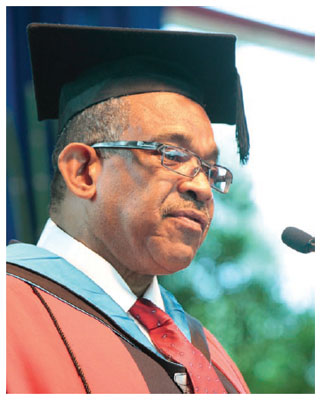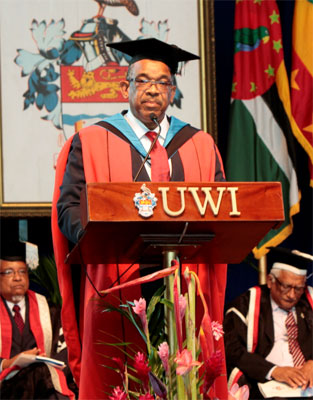 |
 |
 |
|
December 2013
|
I am grateful for the honour and privilege of being asked to address the 2013 graduating class of the Faculties of Engineering and Law here at the St Augustine Campus of The University of the West Indies. Let me begin by offering my heartiest congratulations to you, the members of the 2013 graduating class on the successful completion of this phase of your academic career. I know the sense of relief, of achievement and pride that this moment brings, but I need not tell you this is only the beginning; that there are many more hours of hard work to come, whether in the workplace or in higher academic pursuits. This is also an opportunity for me to acknowledge the outstanding achievements of my fellow honorary graduands and to congratulate them on the honour bestowed on them by this outstanding campus of this distinguished university. For myself, it is with a sense of pride and humility that I accept this honorary doctorate and wish to publicly express my gratitude to the administration of The University of the West Indies for this signal honour and recognition. As an alumnus of The UWI, it is especially meaningful to be thought worthy of receiving its highest degree and even more so from this St Augustine campus. Whereas for us honorary graduands this ceremony represents an acknowledgement and recognition of service and achievements through various careers, for you members of the 2013 graduating class, this marks the fulfilment of an academic achievement, a source of pride of your families and the hope of your country and the region. You must not underestimate its significance; a full generation after independence, you are members of a very small elite who were given and have grasped the opportunity of a university education and have come through with flying colours. This achievement is not to be taken lightly; neither are your new degrees regarded simply as a qualification for your chosen careers nor the opportunity to increase your earning power. Being a part of that elite also comes with responsibilities to your families, communities and your respective nations. But I want to suggest that it also carries responsibilities towards the wider Caribbean nation of which we are all a part. And why is this so? Firstly, you are graduates of The University of the West Indies, which was conceived and continues to represent the ideal of that Caribbean nation. Most of you will probably not have taken a single class outside the walls of this St Augustine campus but the degree that you now cherish so much is not a St Augustine but a UWI degree. The University of the West Indies, much more so than any other institution, be it the vaunted West Indies cricket team or the nebulous CARICOM, is the genuine glue that continues to hold this region together as it has done for the over 60 years since its inception. But how much longer I ask, can The UWI continue to provide this unifying force in the face of the challenges that confront it? Permit me a brief moment of nostalgia in reminiscing about a time not all that long ago when both faculty and students on the St Augustine and Mona campuses came from all over the Caribbean. Mona in particular was the meeting place for peoples and cultures, and campus life was a kind of year-long CARIFESTA. People from different parts of the Caribbean developed lifelong friendships; married and created new families—husbands taking back wives to their home countries after graduation, wives remaining with their new husbands in their adopted countries. This was the Caribbean in the making, real integration—far more genuine and effective than meetings of Heads of Government at which no decisions of significance are taken; the bloated bureaucracies of our regional institutions or silly meaningless tokenisms like CARICOM passports which don’t make travel and entry from one country to the other in the region any easier. It is no accident that CARICOM achieved its most significant strides towards functional cooperation during that last two decades of the 20th century because it coincides with the period when graduates of The UWI became heads of governments and assumed top leadership positions across all spheres of activity throughout the nation and the region. The Caribbean as we knew it at the end of the 20th century was essentially a UWI creation where these leaders were bound not only by family ties but were imbued with a sense of their regional commonality.
There is an ongoing debate in Jamaica today about the relevance and usefulness of CARICOM, with recurrent calls for the country to actually leave the Community as it is currently structured and operates. Yet amidst those calls there is no suggestion that we no longer want to be part of a Caribbean nation—no calls for leaving UWI, CXC or the West Indies cricket team; no ladies and gentlemen, the call is to leave CARICOM. This is a very important distinction because it says to us that my generation has somewhere along the way lost the plot in that our current leaders both political and technical have become too engrossed in creating the institutional trappings of functional cooperation, that in the process they have lost sight of the essential element that makes the Caribbean one—you, its people. My own assessment is that rather than creating the enabling environment for people of the Caribbean to integrate (as UWI did so effectively in the past) our leaders, yes the leaders of my generation have instead got in the way of the people by creating structures, institutions and a bloated bureaucracy that only they understand. In CARICOM and its multifarious institutions we have created a metaphor for integration not integration itself. My charge to you today is for your generation to rescue the regional project of creating a Caribbean nation from the bureaucrats in Georgetown and the political leaders whose vision rarely extend beyond their five-year terms in office. You can begin by seeing the geographical space of the Caribbean as your space, your oyster, your nation. Insist on your right to move freely from Port of Spain to Kingston to Bridgetown and Georgetown. Whether you set out to look for opportunities for further studies for yourself; as you leave here in search of work and the start of new careers; and when you simply come to plan for a family vacation consider the Caribbean, your nation, as first among equals. A crucial element in this mission to rescue the regional project is your individual commitment to the preservation of The University of the West Indies as a truly regional university—regional not just in the governance structures that link the individual campuses together, but in your openness and willingness to take post-graduate courses and research projects at Mona or Cave Hill and to remain and teach at those campuses also, even if you eventually return to give service to the St Augustine campus and to Trinidad and Tobago. In the short term it might be St Augustine’s loss but in the long term it is UWI’s gain. Similarly, for those of you setting out to build careers, you should not confine yourself to the physical space that is Trinidad and Tobago; remember the Caribbean is your nation, your oyster, and what might be Trinidad and Tobago’s loss will be the region’s gain and your individual contribution to the building of a Caribbean nation. And if you must stay at home here in Trinidad and Tobago, do not be silent or passive observers to the actions of those who advocate and promote insularity and divisiveness. The region is depending on you whom we have prepared to lead us into the future; to make your voices heard; to promote, protect and help to build the Caribbean as the place where your sons and daughters will want to raise their families and build their careers Like all significant strides in the history of human advancement, the project of creating a Caribbean nation will inevitably go through advances and setbacks in a process of trial and error. Our pre-independence leaders got it wrong in hindsight with the experiment of political federation. Their immediate successors learned from the experience by focusing on functions and processes to facilitate the development of an integrated Caribbean, but my generation became mesmerized with creating the structures and lost sight of the people. With the knowledge gained from a first-class education here at The UWI and the legacy of an institution that has for more than 60 years led the way in the creation of a Caribbean nation, the responsibility of leading us through the next stage is in your hands. Good luck and God’s speed. This is the address given to graduates of the Faculties of Engineering and Law, UWI, St Augustine, on October 24, 2013.
|




 Today The UWI remains pre-eminent among tertiary level educational institutions in preparing graduates to assume leadership positions across the Caribbean. At the same time, permit me to say it is a matter of regret to observe that in the first decades of the 21st century The UWI has also lost many elements of its regional personality that were so essential in the creation of that Caribbean nation. I hasten to emphasize that no criticism is being made here nor is any implied. We are all aware of the pressures under which all universities operate today and especially a regional university like The UWI, which depends on national governments for a substantial portion of its funding—not to mention the increased demands for university places, the cost of providing such places and the competition from other institutions, both regional and external. While the devolution of administration to the national campuses is understandable and in many respects inevitable, and is, on balance a positive development, one can’t help having the feeling that in responding to these everyday demands of survival and viability we have thrown out the baby with the bath water—have been too willing to give up the ideal of what UWI was and could be, in building a Caribbean nation with greater cross-fertilization of faculty, students and programmes across all its campuses. I say this because any intelligent observer will notice a clear correlation between the decline of regionalism and the decentralization of the governance structures of The UWI and the growth of the national campuses.
Today The UWI remains pre-eminent among tertiary level educational institutions in preparing graduates to assume leadership positions across the Caribbean. At the same time, permit me to say it is a matter of regret to observe that in the first decades of the 21st century The UWI has also lost many elements of its regional personality that were so essential in the creation of that Caribbean nation. I hasten to emphasize that no criticism is being made here nor is any implied. We are all aware of the pressures under which all universities operate today and especially a regional university like The UWI, which depends on national governments for a substantial portion of its funding—not to mention the increased demands for university places, the cost of providing such places and the competition from other institutions, both regional and external. While the devolution of administration to the national campuses is understandable and in many respects inevitable, and is, on balance a positive development, one can’t help having the feeling that in responding to these everyday demands of survival and viability we have thrown out the baby with the bath water—have been too willing to give up the ideal of what UWI was and could be, in building a Caribbean nation with greater cross-fertilization of faculty, students and programmes across all its campuses. I say this because any intelligent observer will notice a clear correlation between the decline of regionalism and the decentralization of the governance structures of The UWI and the growth of the national campuses.